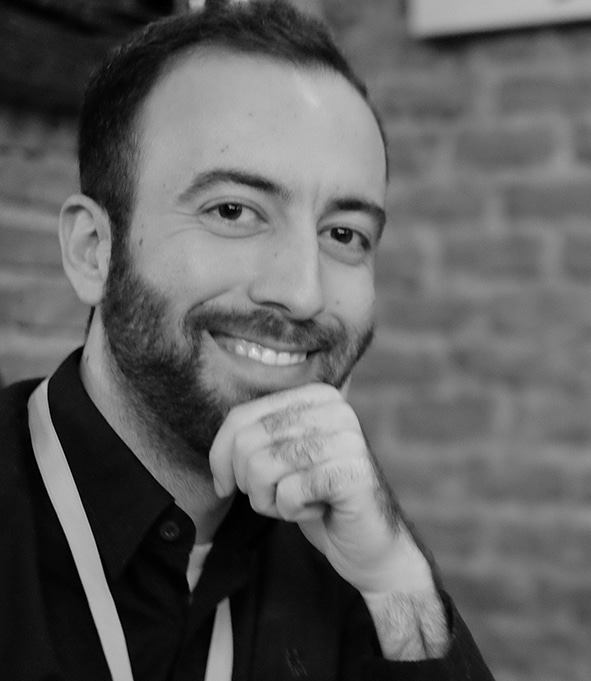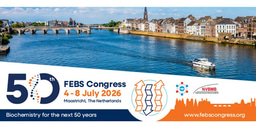Career support through a FEBS Long-Term Fellowship: from Germany to Uppsala, Sweden, for research on protein degradation pathways

 Suayib Üstün is an Emmy Noether Group Leader at the Center for Plant Molecular Biology (ZMBP) at the University of Tübingen, Germany. His lab investigates how plant pathogens perturb proteolytic degradation pathways such as the proteasome and autophagy. Current research in his team focuses on the potential interplay between protein synthesis–transport and degradation during plant–microbe interactions. Findings during his PhD and his postdoctoral research as a FEBS Fellow founded the basis for his current research. Before starting his group leader position in 2018, he completed his FEBS Long-Term Fellowship at the Swedish University of Agricultural Sciences in Uppsala where he studied the crosstalk of the proteasome and autophagy during immunity in plants.
Suayib Üstün is an Emmy Noether Group Leader at the Center for Plant Molecular Biology (ZMBP) at the University of Tübingen, Germany. His lab investigates how plant pathogens perturb proteolytic degradation pathways such as the proteasome and autophagy. Current research in his team focuses on the potential interplay between protein synthesis–transport and degradation during plant–microbe interactions. Findings during his PhD and his postdoctoral research as a FEBS Fellow founded the basis for his current research. Before starting his group leader position in 2018, he completed his FEBS Long-Term Fellowship at the Swedish University of Agricultural Sciences in Uppsala where he studied the crosstalk of the proteasome and autophagy during immunity in plants.
Research articles during the tenure of the FEBS Fellowship:
Üstün, S. and Hofius, D. (2018) Anti- and pro-microbial roles of autophagy in plant-bacteria interactions. Autophagy 14,1465–1466
Üstün, S., Hafrén, A., Liu, Q., Marshall, R. S., Minina, E. A., Bozhkov, P. V., Vierstra, R. D., and Hofius, D. (2018) Bacteria exploit autophagy for proteasome degradation and enhanced virulence in plants. Plant Cell 30, 668–685
Hafrén, A., Üstün, S., Hochmuth, A., Svenning, S., Johansen, T. and Hofius, D. (2018) Turnip mosaic virus counteracts selective autophagy of the viral silencing suppressor HCpro. Plant Physiol.176, 649–662
Üstün, S., Hafrén, A., and Hofius, D. (2017) Autophagy as a mediator of life and death in plants. Curr. Opin. Plant Biol. 40,122–130
What do you think are the benefits of doing a postdoc stint abroad?
A research stay abroad definitely broadens your horizon, not only scientifically but also culturally. Going to Sweden from Germany did not sound like an extreme move in the beginning but still I realized very soon that many things work differently in Sweden. I guess if you still want to stay in academia and research it is also good to experience different research systems and institutes with their advantages and disadvantages. It will help you to implement positive aspects in your future research home.
What is your view on changing fields of research during early-career stages?
I don’t think it is really necessary to change fields completely during early-career stages. During my PhD I worked on a different patho-system and on the proteasome. When I applied for the FEBS Fellowship I had the plan to switch model organisms and also to gain knowledge and tools to study autophagy. Somehow it is good to have a golden thread in your research and this is what I wanted to achieve at different stages during my career. It helped me to develop an overall theme for my own research team. Now, we are looking into interplays between the protein synthesis–transport–degradation triangle and how plant pathogens manipulate them.
How important was the Fellowship to obtaining your position now?
When I finished my PhD, I realized that I wanted to become an independent scientist and group leader one day. Applying for postdoc positions was not really attractive to me, because I really wanted to develop my own ideas and projects. Soon, I realized that I could achieve this by applying for fellowships with my own research projects, which would in the end help me to become a future group leader. It is a very tough and challenging process to develop your own ideas and write research proposals, but it definitely prepares you for the next steps in your research career. Writing and obtaining the FEBS Fellowship was therefore an essential step in my career to become a group leader.
How did you move up the career ladder from your Fellowship?
During my Fellowship I applied for a couple of group leader and lecturer positions (which I didn’t get) but my initial plan was to apply for the Emmy Noether Programme of the DFG (German Research Foundation). This is a perfect programme to generate and apply with your own project proposal. The funding is equal to an ERC starting grant. In the end, I was very lucky to obtain this grant which enabled me to start my current position at the Center for Plant Molecular Biology (ZMBP) at the University of Tübingen.
How have you found the transition from postdoc to group leader?
First of all, it’s a lot of fun. It’s great to be able to realize your own ideas, pursue your research goals and be able to make important decisions. In the beginning it was actually quite tough because I realized that I suddenly had responsibilities for a PhD student and a postdoc. Nobody in academia really “learns” how to lead a team and somehow you question yourself if it is right how you deal with your team members. It helps a lot to get help from more experienced group leaders. One thing that made a huge difference was to attend leadership courses.
Do you have any tips for the next crop of early-career researchers applying for FEBS Fellowships?
First of all, it is important to identify your research goals and future research topics. This will help you when you search for suitable host labs. The Fellowship should set the stage for your next career step to become fully independent in the end. Consider the Fellowship time as a time in which you generate (preliminary) data and new ideas that will help you to become a group leader. It is also crucial to identify host labs that fully support you with your wish to become independent to be able to continue the projects that you proposed and further developed during your Fellowship.
For information on FEBS Long-Term Fellowships on the FEBS website, start here.
Top image of post: by David Mark from Pixabay





Join the FEBS Network today
Joining the FEBS Network’s molecular life sciences community enables you to access special content on the site, present your profile, 'follow' contributors, 'comment' on and 'like' content, post your own content, and set up a tailored email digest for updates.